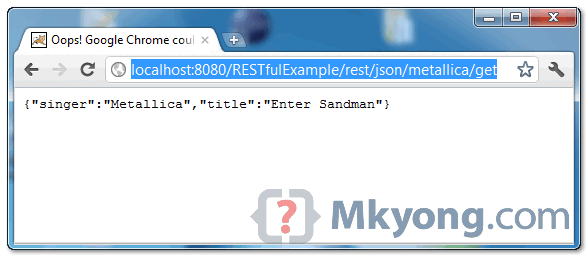JSON Example With Jersey + Jackson
http://www.mkyong.com/webservices/jax-rs/json-example-with-jersey-jackson/
Jersey uses Jackson to convert object to / form JSON. In this tutorial, we show you how to convert a “Track” object into JSON format, and return it back to user.
1. Dependency
To make Jersey support JSON mapping, declares “jersey-json.jar” in Maven pom.xml file.
<dependency> <groupId>com.sun.jersey</groupId> <artifactId>jersey-server</artifactId> <version>1.8</version> </dependency> <dependency> <groupId>com.sun.jersey</groupId> <artifactId>jersey-json</artifactId> <version>1.8</version> </dependency>
Review the downloaded dependencies in your project classpath, Jackson and related libraries are inlcuded.
2. Integrate JSON with Jersey
In web.xml, declares “com.sun.jersey.api.json.POJOMappingFeature” as “init-param” in Jersey mapped servlet. It will make Jersey support JSON/object mapping.
<init-param> <param-name>com.sun.jersey.api.json.POJOMappingFeature</param-name> <param-value>true</param-value> </init-param>
File : web.xml - full example.
<web-app ...> <servlet> <servlet-name>jersey-serlvet</servlet-name> <servlet-class>com.sun.jersey.spi.container.servlet.ServletContainer</servlet-class> <init-param> <param-name>com.sun.jersey.config.property.packages</param-name> <param-value>com.mkyong.rest</param-value> </init-param> <init-param> <param-name>com.sun.jersey.api.json.POJOMappingFeature</param-name> <param-value>true</param-value> </init-param> <load-on-startup>1</load-on-startup> </servlet> <servlet-mapping> <servlet-name>jersey-serlvet</servlet-name> <url-pattern>/rest/*</url-pattern> </servlet-mapping> </web-app>
3. Simple Object
A simple “Track” object, later Jersey will convert it into JSON format.
package com.mkyong; public class Track { String title; String singer; public String getTitle() { return title; } public void setTitle(String title) { this.title = title; } public String getSinger() { return singer; } public void setSinger(String singer) { this.singer = singer; } @Override public String toString() { return "Track [title=" + title + ", singer=" + singer + "]"; } }
4. JAX-RS with Jersey
Annotate the method with @Produces(MediaType.APPLICATION_JSON). Jersey will use Jackson to handle the JSON conversion automatically.
package com.mkyong.rest; import javax.ws.rs.Consumes; import javax.ws.rs.GET; import javax.ws.rs.POST; import javax.ws.rs.Path; import javax.ws.rs.Produces; import javax.ws.rs.core.MediaType; import javax.ws.rs.core.Response; import com.mkyong.Track; @Path("/json/metallica") public class JSONService { @GET @Path("/get") @Produces(MediaType.APPLICATION_JSON) public Track getTrackInJSON() { Track track = new Track(); track.setTitle("Enter Sandman"); track.setSinger("Metallica"); return track; } @POST @Path("/post") @Consumes(MediaType.APPLICATION_JSON) public Response createTrackInJSON(Track track) { String result = "Track saved : " + track; return Response.status(201).entity(result).build(); } }
5. Demo
See demo for GET and POST request.
1. GET method
When URI pattern “/json/metallica/get” is requested, the Metallica classic song “Enter Sandman” will be returned in JSON format.
{
"singer":"Metallica",
"title":"Enter Sandman"
}
2. POST method
To test post request, you can create a RESTful client (refer to this Jersey client APIs example), and “post” the json format string to URI pattern “/json/metallica/post“, the posted json string will be converted into “Track” object automatically.
Download Source Code
References
- Jackson Official Website
- JSON Support in Jersey
